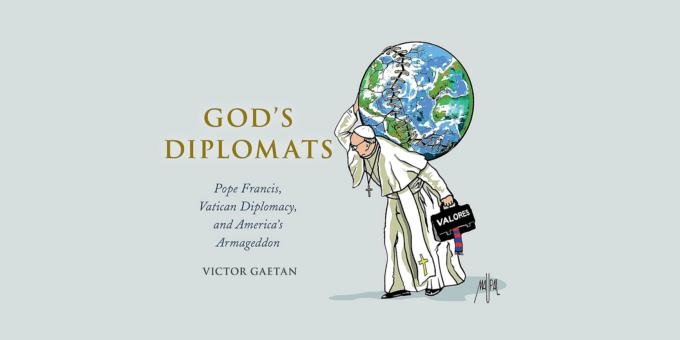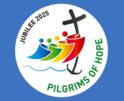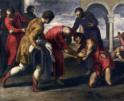
Culture
The Church has great experience of wrestling with fallen humanity and has a wealth of wisdom in holy Scripture, natural law, and Church social teaching that can help create just conditions for lasting peace.

Duncan
There's a new book that's just been published about the Vatican's diplomats, their history and current engagements. It's called "God's Diplomats: Pope Francis, Vatican Diplomacy and America's Armageddon," and it's written by a long-time friend of mine, Victor Gaetan. It's a fascinating read, well written, widely sourced, with over a hundred pages of endnotes. It is also a sympathetic view of the Church's involvement in world diplomacy, with particular emphasis on recent hotspots. I recommend it most highly.
If Americans have a flaw as a people, it's that we're generally ignorant of other places in the world. I know I am. "I'll do anything for Latin America, as long as I don't have to read about it." This is a problematic attitude, of course, because willy nilly we find ourselves in a position as world superpower, with enormous influence around the world.
American foreign policy, starting with the stereotypical Ugly American tourist, has often been afflicted by blinders and cultural insensitivity. As a nation of immigrants, we should really know better. To put it mildly, our recent wars in Vietnam, Afghanistan, and Iraq have not been notable successes, as the popes at the time warned. This book can help educate our ignorance on world affairs.
The Church, of course, is not directly involved in structuring the earthly city. Our divine founder said, "My kingdom is not of this world," and also to "Render unto Caesar the things that are Caesar's, and to God the things that are God's," thus expounding a certain degree of separation of Church and state. Nevertheless, the Church does have a leavening influence on the culture and society in which Catholic churchmen and lay people all live and move. The Church has great experience of wrestling with fallen humanity and has a wealth of wisdom in holy Scripture, natural law, and Church social teaching that can help create just conditions for lasting peace.
This book documents how the Catholic Church through its diplomatic corps has been engaged in recent decades in the world's trouble spots to encourage dialogue, forgiveness, and mutual charity, often with positive results. It's amazing how much good you can do if you don't worry about who gets the credit, and these often selfless, talented, and virtuous diplomats are more interested in results than in publicity. By their fruits you shall know them.
And so, Victor Gaetan leads us through Cuba, the Middle East, Kenya, Colombia, and China to illustrate in detail how the Church tries to better the lot of human beings living in oftentimes difficult if not excruciating conditions under sometimes deplorable leadership. As Pope Pius XI said in a speech in 1929, "When there is question of saving souls, or preventing greater harm to souls, we feel the courage to treat with the devil in person." Hating the sin but loving the sinner leads the Church to engage with all to save as many as possible.
Gaetan gives us a very interesting overview and history of the popes' engagement with the world since the beginning -- including the times of the martyrs (which are still happening, unfortunately), the legalization under Constantine, the barbarian invasions, the middle ages, the Renaissance, the Reformations, the French Revolution, Napoleon, the industrial revolution, and the totalitarianisms and world wars of the 20th century. In the process, he gives us a masterful list of diplomatic rules of thumb.
Obviously, the Church as an institution is not infallible when it comes to practical judgments of a diplomatic or political character, things like the recent private treaty with China over the appointment of Catholic bishops. Mistakes have been and, to a certain extent, will always be made in this area, as arguably happened when the Church made a concordat with Nazi Germany in 1933, or when St. Pius V excommunicated Queen Elizabeth. It is nevertheless salutary to consider the overall force for good that the Church has exercised on the international and local stages in recent decades, and how Pope Francis is trying to follow Christ's example and the themes of his illustrious predecessors in the papacy. Time will tell how faithful and successful he has been. Let us pray that he is.
- Dwight G. Duncan is professor at UMass School of Law Dartmouth. He holds degrees in both civil and canon law.
Recent articles in the Culture & Events section
-
'Put no trust in princes'Greg Erlandson
-
The power of hopeMichael Reardon
-
Scripture Reflection for March 30, 2025, Fourth Sunday of LentDeacon Greg Kandra
-
The vibrant tapestry of the church in BostonWendy Mejia
-
Scripture Reflection for March 16, 2025, Second Sunday of LentDeacon Greg Kandra























